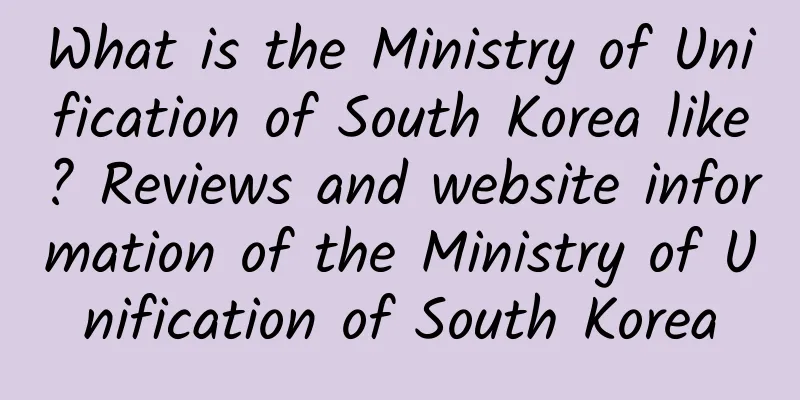South Korea's Ministry of Unification: A bridge to peaceful reunification of the Korean Peninsula
The Ministry of Unification (Korean: 통일부; English: Ministry of Unification) is a special and famous national administrative agency of the Republic of Korea, which is responsible for the unification of the Korean Peninsula. The predecessor of this department can be traced back to the National Unification Agency established on March 1, 1969. After several reorganizations and name changes, it was finally officially reorganized into the current Ministry of Unification on February 28, 1998. The Minister of the Ministry of Unification is called the Minister of Unification, and is also one of the State Councilors.
History of the Ministry of Unification of South Korea
The history of the Ministry of Unification can be traced back to 1969, when the South Korean government established the National Unification Agency in response to the division of the Korean Peninsula. Over time, this agency has undergone many reforms and adjustments. On December 27, 1990, the National Unification Agency was renamed the Unification Agency. On February 28, 1998, in order to further strengthen its role in national unification affairs, the Unification Agency was reorganized into the Ministry of Unification, becoming an important administrative department in the South Korean government.
Main responsibilities of the Ministry of Unification of South Korea
The main responsibilities of the Ministry of Unification include formulating and implementing policies related to the unification of the two Koreas, promoting inter-Korean dialogue, exchanges and cooperation, and humanitarian assistance. In addition, the Ministry of Unification is also responsible for managing education and publicity for the unification cause, aiming to raise public awareness of the importance of unification and promote understanding and trust between the two Koreas.
1. Formulate a policy for the unification of the North and the South
The Ministry of Unification plays a central role in formulating policies for the unification of the North and the South. These policies are aimed at achieving the unification of the Korean Peninsula through peaceful means and ensuring social stability and economic development after unification. The Ministry of Unification cooperates with a number of institutions and organizations at home and abroad to jointly study and formulate unification policies that are suitable for the current international situation and the actual situation on the Korean Peninsula.
2. Promoting North-South dialogue, exchanges and cooperation
The Ministry of Unification actively promotes dialogue, exchanges and cooperation between the North and the South, and promotes communication and understanding between the two sides through various channels and platforms. This includes not only formal dialogue between governments, but also non-governmental exchanges, cultural cooperation, economic cooperation and other levels. Through these efforts, the Ministry of Unification hopes to gradually narrow the gap between the North and the South and lay a solid foundation for future unification.
3. Education and publicity for the management of the unified cause
The Ministry of Unification is also responsible for managing the education and publicity work for the cause of unification. Through education and publicity, the Ministry of Unification hopes to raise public awareness of the importance of unification and strengthen the public's support for the cause of unification. The Ministry of Unification uses various media channels, educational activities and publicity materials to convey the importance and necessity of unification to the public and promote consensus and cooperation among all sectors of society.
Organizational structure of the Ministry of Unification of South Korea
The organizational structure of the Ministry of Unification of South Korea includes multiple departments and agencies, each with its own specific responsibilities and tasks. The core departments of the Ministry of Unification include the Policy Planning Office, the South-North Dialogue and Cooperation Bureau, and the Unification Education and Publicity Bureau. These departments work together to promote the progress of the unification cause.
1. Policy Planning Office
The Policy Planning Office is one of the core departments of the Ministry of Unification and is responsible for formulating and implementing policies related to the unification of the North and the South. The office formulates unification policies that are in line with national interests and people's expectations by studying and analyzing the current international situation and the actual situation on the Korean Peninsula.
2. North-South Dialogue and Cooperation Bureau
The North-South Dialogue and Cooperation Bureau is responsible for promoting dialogue, exchanges and cooperation between the North and the South. Through various channels and platforms, the department promotes communication and understanding between the two sides, promotes cooperation between the North and the South in various fields, and creates conditions for future unification.
3. Unified Education and Publicity Bureau
The Unification Education and Publicity Bureau is responsible for managing the education and publicity work for the unification cause. Through various media channels, educational activities and publicity materials, the department conveys the importance and necessity of unification to the public and strengthens the public's support for the unification cause.
The work achievements of the Ministry of Unification of South Korea
Since its establishment, the Ministry of Unification has achieved remarkable results in promoting the reunification of the Korean Peninsula. By formulating and implementing a series of effective policies, the Ministry of Unification has successfully promoted dialogue, exchanges and cooperation between the North and the South, and promoted the improvement of inter-Korean relations. In addition, the Ministry of Unification has also raised public awareness of the importance of reunification and strengthened the public's support for the reunification cause through various educational and publicity activities.
1. Progress of North-South Dialogue
The Ministry of Unification has made significant progress in promoting inter-Korean dialogue. Through multiple high-level dialogues and talks, the two sides have reached consensus in many areas and promoted the improvement of inter-Korean relations. These dialogues include not only formal talks between governments, but also people-to-people exchanges and cultural cooperation.
2. Achievements of inter-Korean exchange and cooperation
The Ministry of Unification has also achieved remarkable results in promoting inter-Korean exchanges and cooperation. Through various forms such as economic cooperation, cultural exchanges and people-to-people exchanges, the two sides have carried out extensive cooperation in various fields. Such cooperation has not only promoted the economic development of the two Koreas, but also enhanced the understanding and trust between the two sides.
3. The effect of unified education and publicity
The Ministry of Unification has successfully raised public awareness of the importance of unification through its unification education and publicity efforts. Through various media channels, educational activities and publicity materials, the Ministry of Unification has conveyed to the public the importance and necessity of unification and strengthened public support for the cause of unification.
Future prospects of the Ministry of Unification of South Korea
Looking ahead, the Ministry of Unification will continue to work hard to promote the peaceful reunification of the Korean Peninsula. The Ministry will continue to formulate and implement effective policies to promote dialogue, exchanges and cooperation between the North and the South and promote the improvement of North-South relations. In addition, the Ministry will further strengthen education and publicity for unification, raise public awareness of the importance of unification, and enhance public support for the cause of unification.
1. Continue to promote North-South dialogue
The Ministry of Unification will continue to promote dialogue between the North and the South and promote communication and understanding between the two sides through various channels and platforms. The Ministry of Unification will continue to cooperate with multiple institutions and organizations at home and abroad to jointly study and formulate a unification policy that suits the current international situation and the actual situation on the Korean Peninsula.
2. Strengthening North-South exchanges and cooperation
The Ministry of Unification will continue to strengthen exchanges and cooperation between the North and the South, and promote cooperation in various fields such as economy, culture, and people-to-people exchanges. Through these cooperation, the Ministry of Unification hopes to gradually narrow the gap between the North and the South and lay a solid foundation for future unification.
3. Deepen unified education and publicity
The Ministry of Unification will continue to deepen its unification education and publicity work, and convey the importance and necessity of unification to the public through various media channels, educational activities and publicity materials. The Ministry of Unification hopes that through these efforts, it will further enhance the public's support for the unification cause and promote consensus and cooperation among all sectors of society.
Conclusion
As an important administrative department of the Republic of Korea, the Ministry of Unification has the important mission of promoting the peaceful reunification of the Korean Peninsula. By formulating and implementing effective policies and promoting dialogue, exchanges and cooperation between the North and the South, the Ministry of Unification has achieved remarkable results in promoting the improvement of North-South relations and promoting the cause of reunification. Looking to the future, the Ministry of Unification will continue to be committed to promoting the cause of peaceful reunification of the Korean Peninsula and make unremitting efforts to achieve the goal of reunification between the North and the South.










